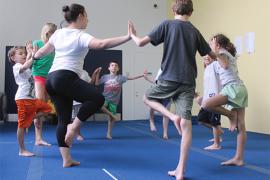Slow down. Camp is fast. The world seems fast. Everything is at our fingertips, literally, and it seems our attention spans have suffered. That’s definitely the old guy in me talking. Maybe suffered is too critical and sounds a bit like “back in my day . . . ” I guess it’s really that our attention spans have adjusted to the pace of our world and the culture of the information age. What does all of that mean? It seems like there is a lot more to do, in a lot less time, with an increased sense of urgency. That is the kryptonite to your superpower. It’s trying to take your ability to make time.
Let’s start by recognizing that we’re bringing this mindset into the camp environment. In some ways camp matches that intensity — so many activities, transitions, and scream-singing squeezed into every moment. Yet, in other ways, it is the opposite — nothing but time to hang out with friends, walk in the woods, float on the lake, and stare into the fire. It’s enough to make your head spin.
Given all of that, how do you manage your time at camp? As a camp counselor, program staff, or any other frontline staff member, it’s on you. Simply put, you are the reason kids have a good time at camp. Just being responsible for a group of kids is plenty, but that’s not how camp works. You will be asked to do and remember a bunch of things. Sometimes they’ll be directly related to your group of kids, like remembering who has medications to take and when. Other times, they’ll seem more indirectly related, like planning and executing an evening activity for the whole camp. So, how do you remember these things, prioritize them, and execute them — all while doing your “actual” job? How do you make time for kids?
Myths
First, let’s deal with a few myths that exist about time and time management. The most destructive myth that is borne from the fast-paced culture we come from is the “if I only had more time” myth. The thinking goes, “If I just had more hours in the day (great example of magical thinking), then I could get more done.” But there is no such thing. It is actually just a way of saying you need to either be more efficient with the time you have, or you need to be responsible for less. Stop wishing for more time; it’s a wish that will always go unfulfilled.
The next myth is multitasking. It’s impossible to do several things at once. What you’re really doing should be called serial-tasking or maybe micro-tasking, where you do parts of something in quick succession, so it feels like you are doing more than one thing. This is super obvious in school and office work, but at camp it looks more like working on your computer to organize the groups for tomorrow’s activity while you are also having a conversation with your co-counselor about the homesick kid in your group. Both of those things would be better served if you did them one at a time.
The last myth that we’ll tackle here (there are plenty more), is that everyone else has it figured out. When we start to feel overwhelmed with tasks and responsibilities, one of the unhealthiest and least-productive things we all do is compare ourselves with the mythical abilities of those around us. They’ve got it all figured out. They do it flawlessly and effortlessly. Wrong. They put in a lot of effort, have plenty of flaws, and the only thing they probably have figured out is some sort of system for getting things done.
If you really dig into and understand what the most productive people do, it comes down to three things. They:
- Have some way to organize themselves
- Do things in an efficient way
- Are good at prioritizing what they are doing
When they follow these guidelines, they seem to be able to make time.
Organizing
How do you organize yourself during the other 10 months of the year? Chances are, you use your phone to remind yourself, which may not be an option for you at camp. Regardless, whether you use a notes app, your calendar, or place old-school sticky notes all over your desk and computer, the basic thing you’re doing is writing each task down. While camp is definitely more analog than digital, writing things down is still totally doable. Super-organized people also write things down in the same place every time. This summer, decide on a pad of paper on a clipboard, a small pocket-size notebook, or some other nondigital form, and start writing down all of the things you need to do and remember in one place. The key is to stick with it. Keep writing things down. Even if you know you will remember them, write to-do items down anyway and in your designated place. Then you get to do the thing that gives so many people so much joy — cross things off (I see you list makers out there).
Working Efficiently
What does efficient mean? According to Merriam-Webster it means:
- “Productive of desired effects”
- “Especially: capable of producing desired effects with little or no waste (as of time or materials)”
In other words, get it done without wasting time or stuff. Easier said than, well, done. If we are going to be efficient, then we need to know two essential things (assuming we agree with the dictionary): the meaning of “done” and “waste.”
When Is It “Done”?
With every task that you have, can you identify what will have happened if it is done? If you can answer yes to that question, but your answer is a run-on sentence with too many commas or “ands,” then try to break the one task into several. Planning and executing an evening activity may start with one task — such as thinking creatively about a structure and a theme — but will soon turn into several tasks, such as organizing staff assignments, collecting and distributing program supplies, as well as organizing camper groups.
If what “done” means for an assigned responsibility isn’t so clear, ask your direct supervisor, or the supervisor or director who gave you the task, for some additional guidance to make sure you’re hitting the mark.
How Do You Waste Less Time?
Unlike being done, waste and wastefulness are more subjective. If you were to observe me writing, you might think I waste a lot of time. I can spend more than half my time “writing” pacing around the room, changing the record on the turntable, staring out the window, and standing on my couch (I know, that one is weird but true). For me, trying to be creative and writing it down requires a lot of thought, energy, and focus. I think on an idea, debate myself about it, say it out loud, generally let it marinate — and then write it down. That is all to say, that your “wasting time” might be my efficiency.
The best thing to do here is to apply the same kind of idea to waste as you did to being done. Can you clearly articulate what a no-waste outcome would be? Again, sometimes that will be easy, like all of the kids who needed dinnertime medications got them at dinner, no wasting time afterward trying to track kids down. Other times, it just won’t be clear. You may have an idea of what it is or looks like but try looking at it from the outside. What would your director or co-counselor see? Just like being done, this is where your supervisor can be helpful. Just say to them, “I want to do this efficiently and waste as little time and stuff as possible. How do I do that?”
If your camp director is like me, two things will happen. First, they’ll have multiple things to say, some helpful and some not helpful (real talk). Second, they’ll be super impressed with you for even asking that question.
Prioritizing
Writing it all down and doing it efficiently is only important if you do things in the right order. Some duties are just more important than others. The essential ingredient is timing. Prioritizing your responsibilities falls into two basic categories: easy stuff and hard stuff.
Easy stuff to prioritize are those tasks that you have to do every day, all the time, and urgent actions or emergencies. You probably won’t even write some of these down. Counting the kids in your group, preparing your group for the next activity, and saying goodnight to campers at overnight camp or goodbye to campers at day camp are all examples of high-priority, easy things that are part of your daily routine. However, each of these high-priority tasks comes with harder stuff that might not be as easy to prioritize. For example, once you have counted all the kids you are supposed to have, are you supposed to tell someone? How often should you double-check your group? What about preparing for the next activity? The easy part is knowing that the bell is going to ring or that the transition is about to happen. It’s much harder to anticipate where everyone is going, what they might need, and what you might need to help with before they go. I guarantee that you will come up with things you need to do that you can’t just remember on your own. (If you have ever gotten a group of kids ready to go to the waterfront or swimming pool, you know exactly what I’m talking about.)
Urgent tasks or emergencies will cut the line on everything else you’re supposed to do. That’s fine; it’s an emergency. But every emergency subsides, so if you write down the rest of the stuff, you can more easily return to what you were doing when camp is calm again.
Here is a very simple strategy for prioritizing the harder stuff, besides asking your supervisor for help: whether it’s daily duties, one-off things, camper-specific tasks, big, program-related things, or anything else — as soon as you are assigned the task, ask, “When should it get done?”
Once you have a deadline, work backwards from then until now. You’ll likely start to answer your own questions about how much time something will take, where you need to be, and what else, if anything, you need to accomplish in that same timeframe. Working backwards in time by answering these kinds of questions will create tasks like dominoes. When you tip the first one, it triggers the rest.
Important Note
People, in general, are terrible at estimating time. Mostly, we think we can do things way faster than we actually can. So, give yourself more time than you think you need.
At the end of the day, all the stuff you do is important. Mainly because it is connected to someone else. I know not everyone is super organized, and what is suggested here might be a stretch for some. That’s OK! It’s all about trying (and writing it down). Do your best and ask for help. When you’re organized about what you need to do, efficient at doing them, and can prioritize what to do first, then you can exercise the superpower that kids at camp need the most. You can make time for them whenever they need it.
|
Discussion Questions Do you find being organized a challenge? Why or why not? What is something you do that might look like wasting time to someone else but is really a useful part of your process? What are the top three things on your priority list when it comes to your campers? |
Photos courtesy of Green River Preserve, Cedar Mountain, NC.
Reference
Merriam-Webster. (2025). Efficient. merriam-webster.com/dictionary/efficient
Scott Arizala is a leading expert, trainer, and consultant in summer camp. He is the CEO of The Camp Counselor, a consulting and training company, and the co-founder & chairman of Camp Skywild, an organization dedicated to creating access for people with autism in recreation. He is a pioneering contributor and faculty member of Expert Online Training and The Summer Camp Society. Scott is the author of the best-selling book, S’more Than Camp and contributing editor of Happiness, Diversity & Autism: Practical Strategies for Inclusion. For more information, visit TheCampCounselor.com.



